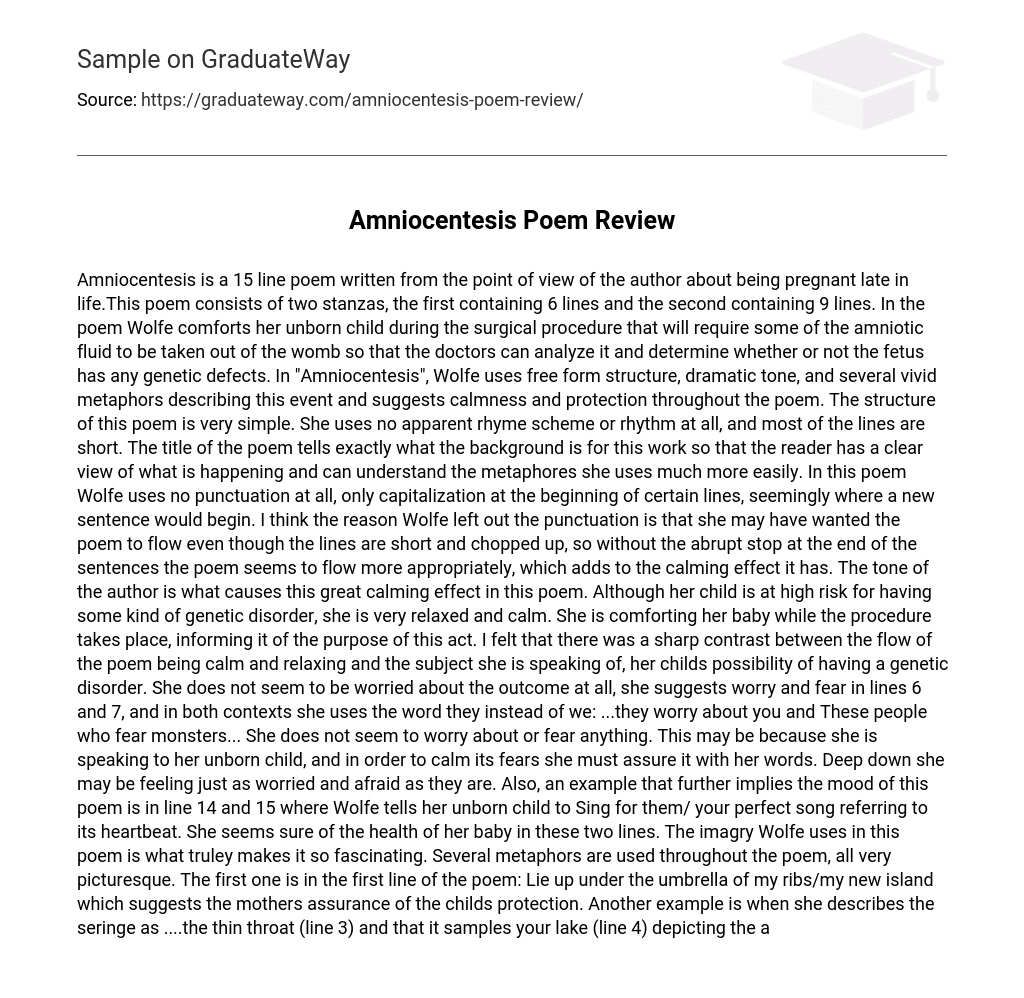Amniocentesis is a poem that reflects on the experience of being pregnant later in life. It is a 15-line poem divided into two stanzas. The first stanza consists of 6 lines while the second one consists of 9 lines.
The poem “Amniocentesis” by Wolfe comforts her unborn child during a surgical procedure. The procedure involves extracting amniotic fluid from the womb to determine if the fetus has any genetic defects. The poem utilizes a free form structure, a dramatic tone, and multiple vivid metaphors to convey a sense of calmness and protection. Its structure is simple, lacking a discernible rhyme scheme or rhythm, with most lines being short. The title provides context and aids in the understanding of the metaphors employed. Punctuation is absent in the poem, except for capitalization at the start of certain lines, resembling the beginning of new sentences.
The lack of punctuation in Wolfe’s poem may be a deliberate choice to maintain a smooth flow despite the short, choppy lines. This contributes to its calming effect. The author’s tone is what creates this sense of calmness. Despite the high risk of a genetic disorder in her child, she remains composed and serene. She soothes her baby during the procedure while explaining its purpose. The contrast between the tranquil flow of the poem and the subject matter, her child’s potential disorder, is striking. She doesn’t appear concerned about the outcome, alluding to worry and fear through the use of “they” instead of “we” in lines 6 and 7: “…they worry about you” and “These people who fear monsters…”.
The speaker appears fearless, perhaps due to speaking to her unborn child as a means of comforting it. It is possible that deep inside she feels the same worries and fears as her unborn child. Line 14 and 15 suggest the mood of the poem, as Wolfe instructs the unborn child to let its heartbeat be their “perfect song.” These lines demonstrate her confidence in her baby’s well-being. The poem is captivating mainly because of the imagery used by Wolfe.
The poem uses several picturesque metaphors. The first metaphor is in the first line where the mother assures the child’s protection, saying “Lie up under the umbrella of my ribs/my new island.” Another metaphor is used to describe the syringe as “the thin throat” (line 3) that samples the amniotic fluid, depicted as “your lake” (line 4). The mother explains to her child that the syringe will test a part of the fluid for what she calls “monsters.” Referring to genetic disorders, she mentions that “These people who fear monsters/will be looking for monsters” (line 7-8).
Finally, the final two lines of the poem – Sing for them/your perfect song – offer a poignant metaphor for the baby’s heartbeat being compared to a perfect song. It is evident that Ellen Wolfe’s love for her child would remain unwavering regardless of any perceived imperfections. By using various metaphors throughout the poem, Wolfe conveys her unconditional love and protection for her child. It is possible that her motivation for writing this poem stemmed from her resentment towards the medical professionals who focused primarily on determining the child’s health. Perhaps, she did not comprehend the potential consequences of these tests and questioned their significance in improving the situation if anything was found. Ultimately, all she desires is to shield and cherish her child. Numerous instances in the poem further reinforce this sentiment. Wolfe adopts a free form structure, employs a dramatic tone, and vividly describes the event through metaphors to convey a sense of tranquility and safeguarding.
Bibliography:





